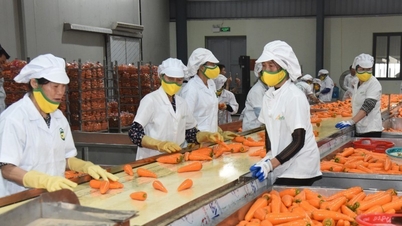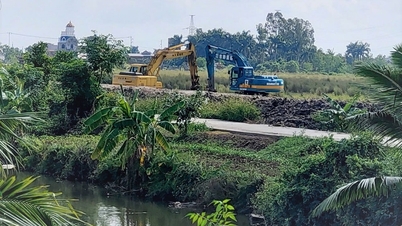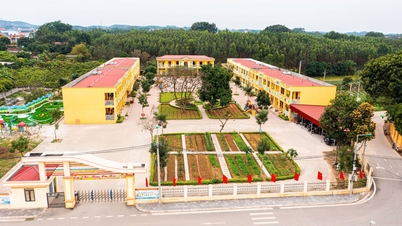Born into a large farming family, at the age of 18, Mr. Tuyen put aside his dream of studying to help his parents with farming. Those years of hardship soon sparked in him the question: “How can I escape poverty?”
After getting married, not willing to endure the life of “muddy hands and feet”, he decided to change his career. He borrowed money to buy a 3-ton truck, transporting fruits everywhere. For 27 years behind the wheel, he traveled to sell fruits from Ham Yen to Hanoi , mainly transporting oranges, agricultural products of his hometown.

By 2015, due to old age and poor eyesight, Mr. Tuyen decided to stop driving. Realizing that the four-season lemon is an easy-to-sell plant with high economic value, Mr. Tuyen boldly converted the hilly land, made terraces like rice fields, and started growing 4 hectares of lemon.
In the middle of the windy hill, the rows of young lemon trees gradually take root and stand firmly on the sloping land. “Growing lemon trees is not just for picking the fruit, but like raising a child, you have to pay attention and take care of every little thing,” Mr. Tuyen said, his eyes shining with pride.

He takes care of clean grass, uses compost, limits chemicals, and keeps the soil “alive.” When the lemons bloom, he covers them carefully and keeps them moist during the dry season. That’s why Mr. Tuyen’s lemon garden has an automatic watering system that works very effectively.
In particular, he grafted a four-season lemon branch onto a two-year-old grapefruit tree – a method that few people dare to try. “The grapefruit roots are strong, deep, and resilient. Grafting a lemon tree will make it more durable and produce more fruit than planting it directly,” Mr. Tuyen explained.

Each grapefruit branch is grafted with a 2-4cm long lemon segment, wrapped in plastic to keep it moist. After about half a month, when the sprouts sprout, he removes the wrapping, adds fertilizer and waters regularly. Thanks to this technique, the tree takes just over a year to flower - twice as fast as the usual planting method.
The graft survival rate reached over 90%, with outstanding productivity. Many farmers in the area came to learn, ask for seeds, and ask him for instructions on how to care for them.
To date, Mr. Tuyen’s family owns 7 hectares of four-season lemons. Each year, the garden yields about 70 tons of fruit, earning over 1 billion VND in revenue. Four-season lemons bear fruit all year round, with each tree bearing a mixture of flowers, young fruit and ripe fruit - a rare sight on this barren hill.
He also creates regular jobs for 5-6 local workers, each earning nearly 10 million VND/month. “The happiest thing is that I not only enrich my family, but also help people around me have jobs,” said Mr. Tuyen.
Not hiding his profession, he is willing to share grafting techniques, tree care methods, and provide quality lemon varieties to other households. Thanks to this, many households in Ham Yen have escaped poverty, transforming ineffective hilly land into fruit-bearing lemon gardens.
The four-season lemon, also known as the four-season lemon, originates from the Americas and has been widely grown in the northern provinces in recent years. This type of lemon has a distinctive aroma, is not bitter when mixed with hot water, is rich in vitamin C, is easy to grow and has few pests. What is special is that the tree bears fruit all four seasons, on the same branch you can see white flowers, young green fruit and ripe yellow fruit.
Mr. Nong Tran Bac, Vice Chairman of Ham Yen Commune People's Committee, assessed that the model of growing four-season lemons has been implemented by households in the commune for about 10 years. Models like Mr. Tuyen's family bring high economic efficiency. Many families apply science and technology in care, so the productivity is high, increasing income, contributing to the economic and social development in the locality.
Source: https://tienphong.vn/bien-doi-can-coi-thanh-vuon-tien-ty-tao-viec-lam-cho-nhieu-lao-dong-dia-phuong-post1789119.tpo







![[Photo] Prime Minister Pham Minh Chinh receives Lao Minister of Labor and Welfare Phosay Sayasone](https://vphoto.vietnam.vn/thumb/1200x675/vietnam/resource/IMAGE/2025/11/11/1762872028311_dsc-2246-jpg.webp)












![Dong Nai OCOP transformation: [Article 4] Reaching national standard products](https://vphoto.vietnam.vn/thumb/402x226/vietnam/resource/IMAGE/2025/11/11/1762825820379_4702-cac-san-pham-trai-cay-chung-nhan-ocop-nongnghiep-174649.jpeg)














































































![Dong Nai OCOP transition: [Article 3] Linking tourism with OCOP product consumption](https://vphoto.vietnam.vn/thumb/402x226/vietnam/resource/IMAGE/2025/11/10/1762739199309_1324-2740-7_n-162543_981.jpeg)







Comment (0)